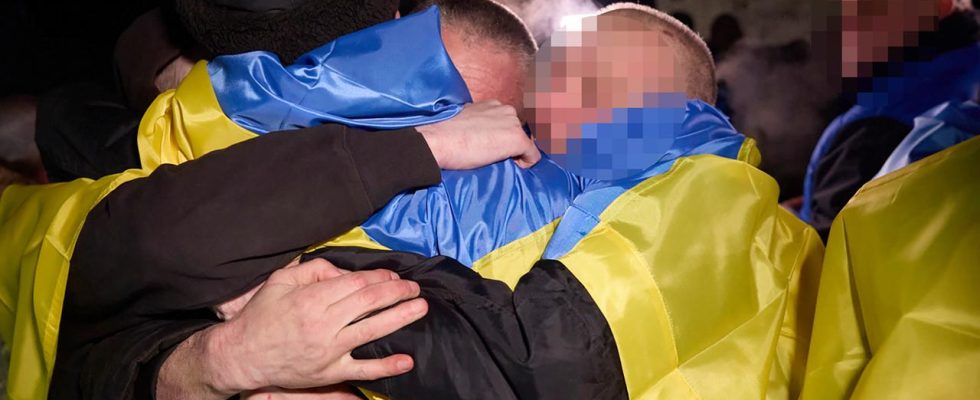report
For the first time in months, Ukraine and Russia exchanged prisoners. However, more than 4,000 Ukrainians are said to still be in Russian hands. The relatives are waiting desperately, information is scarce.
They stand in the darkness and sing the national anthem: some of the 225 men and five women who were recently replaced. Many have the Ukrainian flag draped over their shoulders. They are thin, with very short hair – and not all of them sing along fervently. Some just stand there and look as if they couldn’t believe it.
The exchange came about through the mediation of Saudi Arabia, said Dmytro Lubinets, the parliament’s human rights commissioner, on Ukrainian television. Everyone is in poor physical condition.
“They are exhausted and very thin. I think you can see that they have lost dozens of kilos. Morally they are stable,” says Lubinets.
Biggest Prisoner exchange since the beginning of the war
It is the first prisoner exchange with Russia since August last year and the largest since Russia’s major invasion began almost two years ago. According to the Russian Defense Ministry, in return, almost 240 Russian prisoners of war were able to return to Russia. Moscow made the negotiations difficult and blocked them, said Lubinets, who was involved in the negotiations.
“One was taken to an alleged exchange several times and then had to go back again. Ukraine gave up on you, he was told. Yet it was the Russian side that did not agree to the exchange. I call it physical and psychological torture,” says Lubinets .
Violation of the Geneva Convention?
According to Lubinets, none of those exchanged saw representatives of the International Committee of the Red Cross (ICRC) or had contact with relatives during their captivity. “We see these violations of the Geneva Convention by Russia again and again. But unfortunately there is no response from the International Red Cross.”
This criticism is not new. In the past, however, the ICRC has repeatedly emphasized that it is ready to visit Ukrainian prisoners of war in Russia, but must also be granted access.
Hope for the next exchange
“You can forget the Red Cross or the United Nations,” says Olena Gangala. Her son Denys became a Russian prisoner of war near Mariupol in March 2022 – mother has not heard anything directly from him since then. In September 2022, Denys Gangala was sentenced to life imprisonment for murder in a show trial. Presumably in Russian-occupied Donetsk.
Olena Gangala and other relatives are fighting for every shred of hope. She regularly goes to the coordination staff in Kiev to get information. This consists, among other things, of representatives of the army, the secret service and the Ministry of Defense, and is responsible for Ukrainian prisoners of war.
“We organize actions and meetings. We are loud and remind people that we exist, that they exist. But everything is going badly.” Olena Gangala is happy for the other families, but these days are difficult for them. “My Denys isn’t there,” she says sadly.
Olena Gangala continues to hope for information about her son Denys – and his return from Russian captivity.
Zelensky: “Despite everything, good news”
Around the New Year, many people were killed or injured by Russian missiles and drone attacks in Ukraine. Despite all the challenges, the prisoner exchange is good news, said President Volodymyr Zelensky.
The longed-for exchange is an issue in many places. A video from the border troops, accompanied by dramatic music, shows the exchanged people getting off buses, receiving backpacks, eating something and hugging relatives and helpers.
From the coordination center, exchanged prisoners receive a kit with essentials, including clothing and cell phones. They don’t always know the numbers of their relatives.
Each exchanged prisoner is given an emergency kit – with hygiene products, clothing and a cell phone.
More than 4,000 Ukrainians in captivity
Since Russia’s war of aggression began almost two years ago, more than 2,800 people have been released from captivity. This time there were members of the army, national guard, police and border troops as well as six civilians. Those exchanged are examined by doctors and should be supported, for example with rehabilitation measures.
More than 4,000 Ukrainians are still in Russian hands. This can be found from information from a special commission of the Ministry for Reintegration from October 2023.
Officially, around 26,000 people are considered missing: 15,000 army personnel and 11,000 civilians are in the corresponding register of the Ukrainian Interior Ministry. President Zelenksyj promised to do everything to bring them back.
Azovstal defender also free
The 230 people who have now been released were taken prisoner by, among other things, the Russian occupation of the Chernobyl nuclear power plant, as well as in the fight for Snake Island, the port city of Mariupol and the Azov Valley plant there.
The army doctor Halina Fedyshyn was also exchanged and has now received a marriage proposal from her fiancé Mykola, who is also a soldier. His commander published the yes word on Facebook – complete with flowers, a hug and a kiss. Just one of many stories making the rounds now.
“I talk about it, then it’s easier”
Meanwhile, Olena Gangala doesn’t have much choice but to continue to hope that her son Denys will be there at the next exchange. Her husband lives in Russian-occupied Luhansk in the east of the country. Since she can’t do it on her own, she seeks help from psychologists. “It helps me to talk and I don’t care who I talk to. Even strangers. I ride in the taxi – I talk about it, I ride the bus – I talk about it, then it’s easier,” says Gangala.
Andrea Beer, ARD Kiev, tagesschau, January 4th, 2024 6:57 p.m

